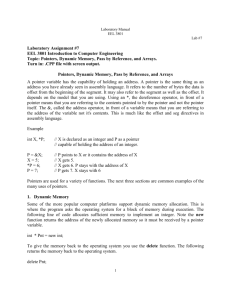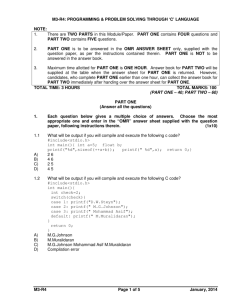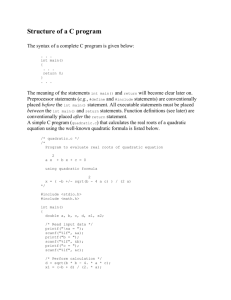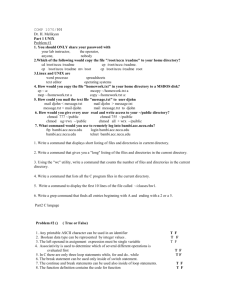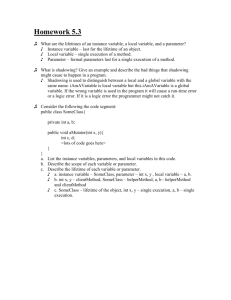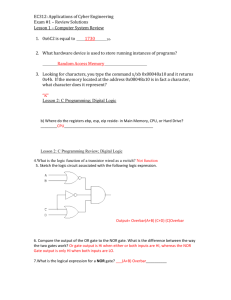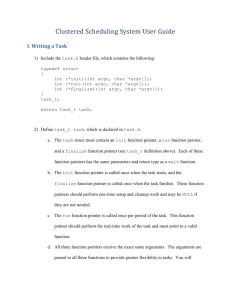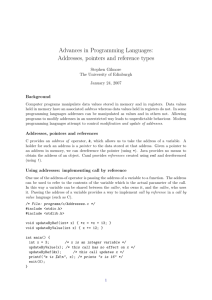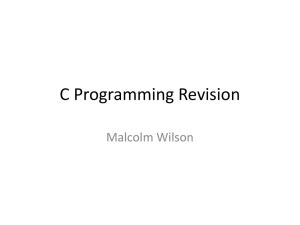copies the address of an argument into the formal parameter
advertisement
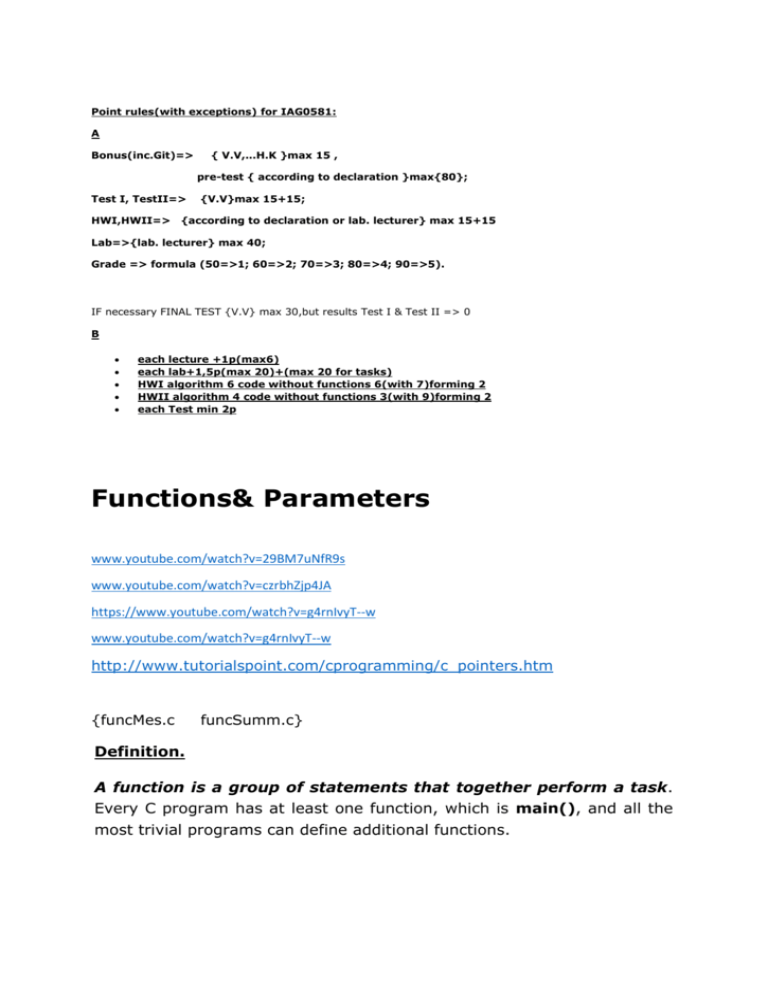
Point rules(with exceptions) for IAG0581:
A
Bonus(inc.Git)=>
{ V.V,...H.K }max 15 ,
pre-test { according to declaration }max{80};
Test I, TestII=>
HWI,HWII=>
{V.V}max 15+15;
{according to declaration or lab. lecturer} max 15+15
Lab=>{lab. lecturer} max 40;
Grade => formula (50=>1; 60=>2; 70=>3; 80=>4; 90=>5).
IF necessary FINAL TEST {V.V} max 30,but results Test I & Test II => 0
B
each lecture +1p(max6)
each lab+1,5p(max 20)+(max 20 for tasks)
HWI algorithm 6 code without functions 6(with 7)forming 2
HWII algorithm 4 code without functions 3(with 9)forming 2
each Test min 2p
Functions& Parameters
www.youtube.com/watch?v=29BM7uNfR9s
www.youtube.com/watch?v=czrbhZjp4JA
https://www.youtube.com/watch?v=g4rnIvyT--w
www.youtube.com/watch?v=g4rnIvyT--w
http://www.tutorialspoint.com/cprogramming/c_pointers.htm
{funcMes.c
funcSumm.c}
Definition.
A function is a group of statements that together perform a task.
Every C program has at least one function, which is main(), and all the
most trivial programs can define additional functions.
You can divide up your code into separate functions. How you divide up
your code among different functions is up to you(not artificially), but
logically the division is such that each function performs a specific task.
Function definition in C programming consists of a function
header and a function body.
Here are all the parts of a function:
Return Type − A function may return a value. The return_type is the data
type of the value the function returns. Some functions perform the desired
operations without returning a value. In this case, the return_type is the
keyword void.
Function Name − This is the actual name of the function. The function name
and the parameter list together constitute the function signature.
Parameters − A parameter is like a placeholder. When a function is invoked,
you pass a value to the parameter. This value is referred to as actual parameter
or argument. The parameter list refers to the type, order, and number of the
parameters of a function. Parameters are optional; that is, a function may
contain no parameters.
copies the actual value of an
argument into the formal parameter of the function. In this
Call by value .This method
case, changes made to the parameter inside the function have no effect
on the argument.
copies the address of an
argument into the formal parameter. Inside the function, the
Call by reference. This method
address is used to access the actual argument used in the call. This
means that changes made to the parameter affect the argument.
{ epoint1.cpp
funcVan.c
}
Function Body − The function body contains a collection of statements that
define what the function does.
There are three places where variables can be declared in C
programming language −
Inside a function or a block which is called
Outside of all functions which is called
In
the
called
formal parameters.
definition
{ point61.cpp
of
local
variables.
global variables.
function
parameters
which
are
without-- Ltel.cpp }
Some C programming
tasks are performed more easily with
pointers, and other tasks, such as dynamic memory allocation, cannot be
performed without using pointers. So it becomes necessary to learn pointers
to become a perfect C programmer.
As you know, every variable is a memory location and every memory location
has its address defined which can be accessed using ampersand (&) operator,
which denotes an address in memory.
#include <stdio.h>
//standard input output
#include <stdlib.h> //standart library
void swap1( int a, int b )
{
printf("a = %d
b = %d\n",a,b);
int abi = a; a = b; b = abi;
printf("a = %d
b = %d\n",a,b);
}
void swap2( int * p, int * q )
{
printf("Addresses:
p = %d
printf("Initial values:
q = %d\n", p, q);
*p = %d
*q = %d\n",*p,*q);
int abi = *p; *p = *q; *q = abi;
printf("Final values:
*p = %d
*q = %d\n",*p,*q);
}
void swap3( int & a, int & b )
// by reference
{
int abi = a; a = b; b = abi;
}
int main()
{
int m = 123, n = -17;
swap1( m, n );
printf("swap1: m = %d
n = %d\n", m, n);
swap2( &m, &n );
printf("swap2: m = %d
n = %d\n", m, n);
swap3( m, n );
printf("swap3: m = %d
n = %d\n", m, n);
system("PAUSE");
return 0;
}
A pointer is a variable whose value is the address of another variable, i.e.,
direct address of the memory location. Like any variable or constant, you
must declare a pointer before using it to store any variable address. The
general form of a pointer variable declaration is –
type *varName; --- int *point1;
/* pointer to an integer */
The actual data type of the value of all pointers, whether integer, float,
character, or otherwise, is the same, a long hexadecimal number that
represents a memory address. The only difference between pointers of
different data types is the data type of the variable or constant that the
pointer points to.
(a) we define a pointer variable,
(b) assign the address of a variable to a pointer,
(b) finally access the value at the address available in the pointer variable.
This is done by using unary operator * that returns the value of the
variable located at the address specified by its operand.
#include <stdio.h>
int main () {
int
var = 20;
/* actual variable declaration */
int
*ip;
/* pointer variable declaration */
ip = &var;
/* store address of var in pointer variable*/
printf("Address of var variable: %x\n", &var
);
/* address stored in pointer variable */
printf("Address stored in ip variable: %x\n", ip );
/* access the value using the pointer */
printf("Value of *ip variable: %d\n", *ip );
return 0;
}
Address of var variable: bffd8b3c
Address stored in ip variable: bffd8b3c
Value of *ip variable: 20
It is always a good practice to assign a NULL value to a pointer variable in
case you do not have an exact address to be assigned. This is done at the
time of variable declaration. A pointer that is assigned NULL is called
a null pointer.
Ltel.cpp
